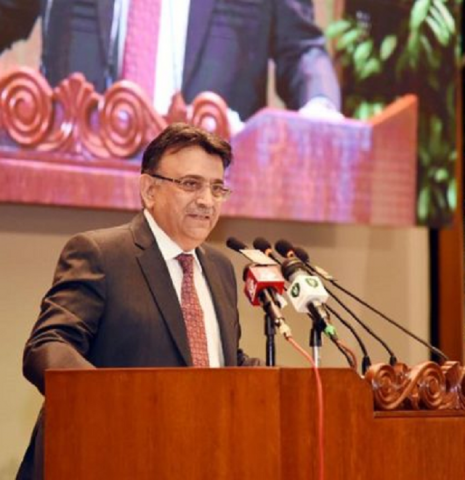IJC hosted for finding innovative ways for country’s better future: CJP
In concluding remarks, Justice Bandial shares his vision for progressive Pakistan where rule of law reigns supreme

Chief Justice of Pakistan (CJP) Justice Umar Ata Bandial on Saturday said that the Supreme Court hosted its 9th International Judicial Conference (IJC) with the intention of addressing past issues and finding innovative ways to secure a better future for Pakistan.
Addressing the closing ceremony of International Judicial Conference, the chief justice said that the summit was an incredible success and had a great turnout with participants ranging from esteemed members of the superior and district judiciary and members of the legal community to members of the executive branch and foreign speakers provided their valuable recommendations regarding steps to be taken for improving the dispensation of justice.
In his concluding remarks, CJP Bandial shared with the participants his vision for a prosperous and progressive Pakistan where the rule of law reigns supreme.
He stressed the importance of ensuring that courts are made equally accessible to all the citizens of Pakistan, irrespective of their gender, religion, race and economic status.
He said that the judiciary and legislature were encouraged to develop alternative dispute resolution (ADR) facilities and procedures, and to promote their use amongst litigants to ensure the inexpensive and expeditious dispensation of justice. The use of technological advancements was also emphasised in streamlining litigation, he added.
Also read: Not judiciary’s role to break political deadlock: CJP
In this regard, the chief justice also informed the participants of the setting up of a National Judicial Automation Unit, approved by the National Judicial (Policy Making) Committee, to help develop a National Online Dashboard for creating an integrated information system for the Judiciary. The first phase of this project is expected to be up and running by and will centralise the data/record of cases pending in all courts on one website. The second phase of this initiative seeks to implement data sharing with other stakeholders in the justice sector.
He also referred to the Federal Judicial Academy’s initiative of launching an e-campus by the end of this year to conduct training workshops and certification courses online for all stakeholders in the justice sector.
The chief justice further emphasised the need for stakeholders in the criminal justice system, namely the police and prosecution, to improve their performance, and coordination with each other to reduce the incidences of crimes. Members of the judiciary and legal community were also urged to make efforts to enhance their capacity, legal knowledge and performance.
He said that the various organs of the state were also prompted to ensure the involvement of women, who form 50% of our population, in decision-making processes.
CJP Bandial also urged that efforts be made to effectively eradicate gender based violence, along with other formal and informal biases that women face, both in the workplace and at home.
He said that the need to counter problems relating to population growth and climate change on a priority basis was also stressed as these issues are ravaging Pakistan at present.
The chief justice placed great emphasis on the need for all stakeholders in the justice sector to come together to improve the quality of justice dispensed by the courts.
He encouraged the use of training sessions for the police and prosecution to increase conviction rates and reduce crime.
Also read: Judge loath to play umpire in political battles
The CJP also suggested that district judges partake in training sessions to learn about amendments and developments in the law and suggested that performance audits be made mandatory at all levels of the judiciary to assess gaps in legal knowledge so that steps may be taken to remedy them. Bar councils and associations were also told to take on a more proactive role in the enhancing the legal knowledge of advocates to improve their quality of work.
He said that the issues of increasing population, worsening climate change and pervasive gender inequality were said to be hindering effective administration of justice. In this respect, the chief justice said that the Supreme Court is committed to protecting the marginalised groups directly affected but the legislature and executive must also do their bit.
CJP Bandial concluded his speech stating that it is only through the collective resolution of the stakeholders in the justice sector that Pakistan can become a nation in which the rule of law, democracy and respect for the Constitution will thrive.



















COMMENTS
Comments are moderated and generally will be posted if they are on-topic and not abusive.
For more information, please see our Comments FAQ